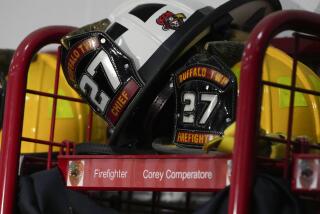Charges in ’69 Death Open Wounds
- Share via
YORK, Pa. — On a summer night nearly 32 years ago, a car carrying 27-year-old Lillie Belle Allen took a wrong turn and headed straight into a race riot that had been raging for days.
The car, driven by Allen’s sister, stalled on railroad tracks. A group of white gang members yelled racial slurs and waved guns at the car’s black occupants. Allen, the mother of two young children who had come from South Carolina for a visit, got out of the car, waved her hands over her head and yelled, “Don’t shoot!”
A shotgun blast to her chest killed her.
Now, prosecutors here say they know who killed Allen. The town’s two-term mayor, Charlie Robertson, an on-duty policeman that night, turned himself in Thursday to police to face allegations that he supplied ammunition to white gang members during the riots and urged them to “kill as many niggers as you can.”
A day earlier, tears running down his face, Robertson stood on the steps of City Hall and, while admitting a racist past, proclaimed his innocence of murder charges.
Robertson is among seven white men linked to the death who were indicted in recent weeks after prosecutors reopened the long-cold case after extensive local press coverage of the riots’ 30th anniversary.
The pursuit of Allen’s killers has pulled a scab off long-dormant wounds from an ugly period in York’s history. The case and the mayor’s alleged involvement are subjects of angry conversations on the streets of a town known best for hosting the nation’s Founding Fathers when they met in 1777 to draw up the Articles of Confederation.
Allen was killed during a week of rioting between blacks and whites in July 1969 that left a third of the city in flames, dozens injured and two dead: Allen and Henry Schaad, a white police officer who was shot three days before Allen’s death. No charges ever were filed in Schaad’s killing, which was reopened by prosecutors in 1999.
The mayor’s arrest came two days after he beat out his opponent in the Democratic primary by just 48 votes. A defiant Robertson, 67, vowed not only to stay in the mayoral race but also to win a third term in November.
“I am not a racist,” he said after his arraignment hearing. “My job is to comfort and heal the city of York.”
Wearing a button reading, “York, PA--see it for yourself,” on his lapel, he told reporters he had done good work on the night of Allen’s slaying.
“When that lady was shot I was the first guy to get there to stop the shooting,” he said outside the red brick City Hall, where he returned to work after posting $50,000 bail. “I was the one who saved the lives of the rest of the people in that family.”
Robertson’s account is sharply refuted in the affidavit submitted for his arrest warrant by the district attorney’s office.
According to prosecutors, one witness told the grand jury that, on the day of the murder and possibly the night before, Robertson provided ammunition to young men on Newberry Street--where a gang of whites known as the Newberry Street Boys was among many groups of young people in the city involved in altercations that week.
A fellow police officer at the time--who now is chief of police in a neighboring city--also testified that he saw Robertson give ammunition to one of the men charged in Allen’s murder.
Prosecutors said they consider Robertson an accessory before the fact and are not making the case that the ammunition he provided killed Allen.
Robertson has admitted that he yelled “White power!” at a rally of white gang members the night before Allen’s death. He denied, however, the allegation that he also said at the time, “If I weren’t a cop, I would be leading commando raids against niggers in the black neighborhoods.”
Robertson said he has changed in the three decades since he held such views--influenced at the time by a brutal mugging he said his father suffered at the hands of young black men.
His attorney pointed out that Robertson, who never married, was the guardian of a Cambodian refugee who now is grown and still calls him Dad.
This city of 45,000, about 40% of whom are minorities, is divided concerning how much one man can change over time and how much that matters in such a case.
“It took them 32 years to get this far? It’s outrageous. And it’s outrageous that they waited to arrest him until after the primary,” said one black resident who identified herself only as Danielle.
Susan Balius, who was a high school student in York during the riots, said she had nightmares for a year afterward and missed out on a normal youth. Balius, who is white and works at the York visitors center, said that until recently she had hoped those days were behind her.
“I think it makes people feel like they’re getting a black eye for something that happened 30 years ago, and we’ve come so far and we’ve done so much. And there is always the question of why this wasn’t taken care of 30 years ago.”
More to Read
Sign up for Essential California
The most important California stories and recommendations in your inbox every morning.
You may occasionally receive promotional content from the Los Angeles Times.














